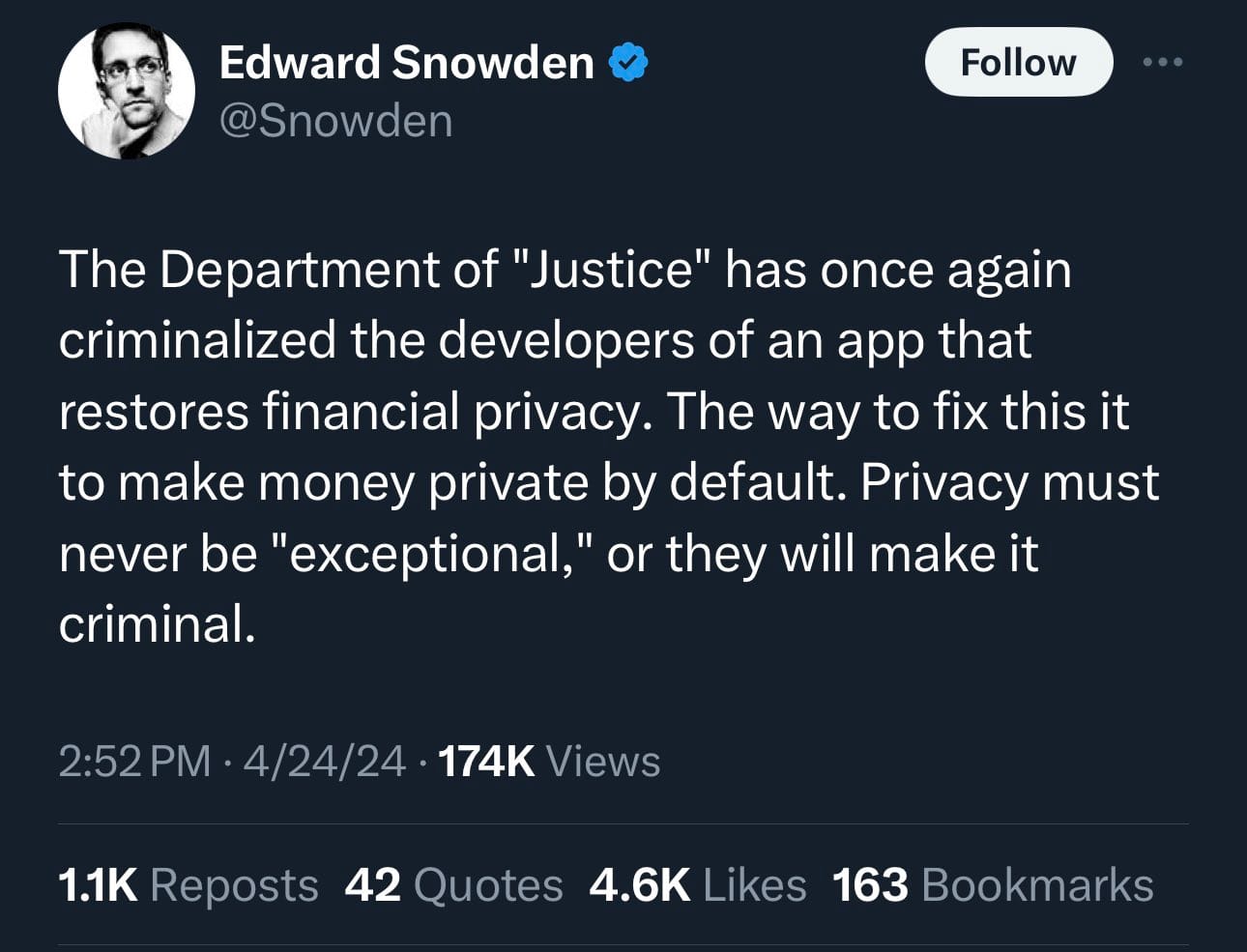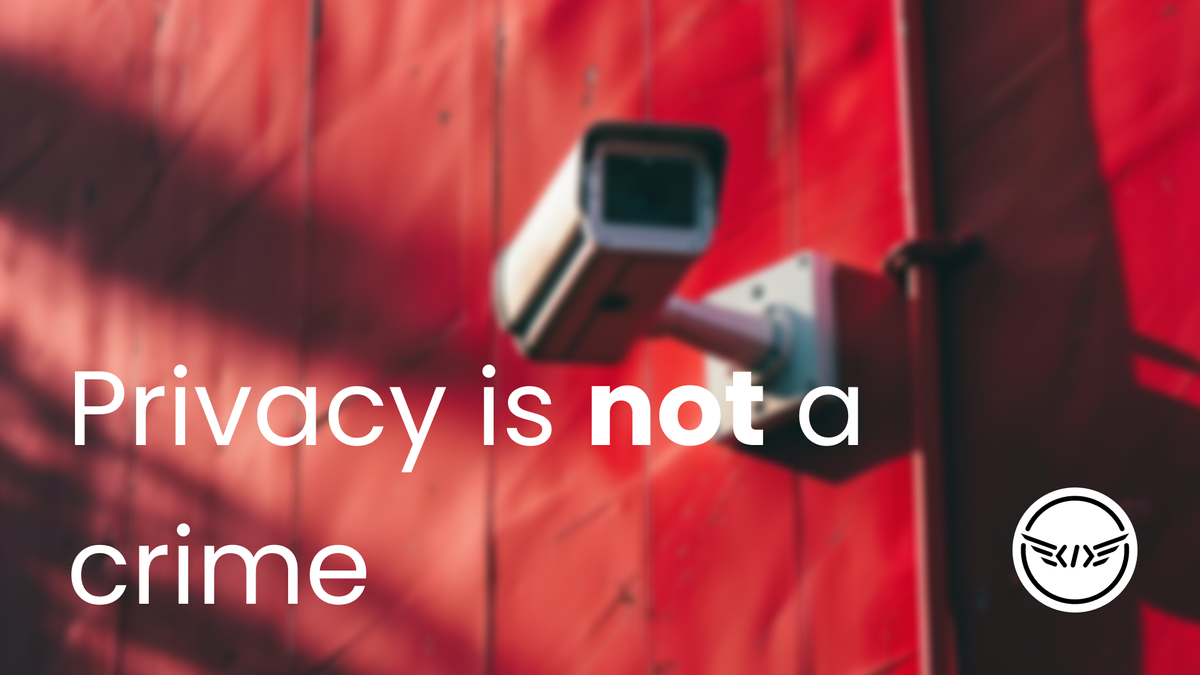We must defend our own privacy if we expect to have any. We must come together and create systems which allow anonymous transactions to take place. People have been defending their own privacy for centuries with whispers, darkness, envelopes, closed doors, secret handshakes, and couriers. The technologies of the past did not allow for strong privacy, but electronic technologies do. We the Cypherpunks are dedicated to building anonymous systems. We are defending our privacy with cryptography, with anonymous mail forwarding systems, with digital signatures, and with electronic money. - Cypherpunk Manifesto
The war against financial privacy has just gone up a notch with the recent arrest of Keonne Rodriguez and William Lonergan Hill, the developers and operators of Samourai wallet, who are being charged with conspiracy to commit money laundering and conspiracy to operate an “unlicensed money transmitting business.” In the indictment from the Southern District of New York, it is alleged that from around 2015 to at least February 2024, Rodriguez and Hill operated Samourai as an unlicensed money transmitting business, earning millions of dollars in fees. Samourai is accused of executing anonymous transactions worth over $2 billion, with a significant portion being proceeds from criminal activities such as darkweb market sales, wire and computer fraud schemes, among others.
Message passing is not money transmission
The key absurdity of these charges is that coinjoin facilitators, like Samourai, act solely as message transmitters; similar to the SWIFT network. They are NOT money transmitters or facilitators in the traditional sense; they merely pass data packets to connected clients. Importantly, clients never relinquish custody of their funds to Samourai or any third party. This collaborative approach between clients distinguishes coinjoin transactions from traditional money transmission services. In short, operating software that suggests transaction templates to end-users without taking custody of funds does not constitute money transmission, even if the template includes an output directed to the service provider.
The indictment also cites specific tweets made by Samourai, alleging that they were open invitations for criminals and "Russian oligarchs" to launder money and evade sanctions through the company's services. However, upon closer examination, a strong argument can be made that these tweets were intended to be humorous and sarcastic, but we will leave that one for the courts to decide. What is undeniably true is that this action is a perfect example of the escalating hostility of the fiat system’s gatekeepers, towards any form of financial privacy. Apparently, their default position is to label any attempt to maintain financial privacy as money laundering, and anyone who develops tools that facilitate this is seen as an accessory to crime.
Financial privacy != criminal activity
This unfortunate conflation of financial privacy with criminal activity not only influences the perceptions of authorities but also seeps into the public consciousness, creating a negative perception of open-source technology. In other words the simple act of moving money privately may be criminalized, which raises significant concerns. The ineffectiveness of Anti-Money Laundering (AML) laws exacerbates the situation. Research indicates that the AML compliance costs incurred by banks are significantly higher, approximately more than 100 times greater than the amount of laundered money seized. Furthermore according to the Journal of Financial Crime 25(2), AML laws are "almost completely ineffective in disrupting illicit finances and serious crime,” as they only manage to seize a paltry 0.1% of illicit funds. To put that in perspective, American financial institutions spend approximately $50 billion annually in AML compliance costs, while stopping only 0.1% of the estimated $2 trillion in financial crime committed each year! While this may not be an argument that can hold up in court in Samourai’s favour, it is still worth noting that the banking system and fiat currencies are still by far the preferred channels for laundering money by criminals, but I digress.

The war on financial privacy
To anyone that has been paying attention this isn’t really much of a surprise, especially as regulators have been targeting “mixing services” and their developers for a while now. In April 2021 Roman Sterlingov was arrested at Los Angeles International Airport for facilitating the laundering of over 1.2 million bitcoin – worth over $760 million at today’s prices – tied to the darknet, in his capacity as the operator of the mixer, Bitcoin Fog. Sterlingov was found guilty of these charges and faces at least 20 years in prison based primarily on chain surveillance data; a verdict his lawyers have vowed to appeal.
The Sterlingov case is particularly concerning because the government was able to establish criminal venue solely by contacting Bitcoin Fog's customer service to inquire about the possibility of using the platform for laundering drug-related funds. Prior to his arrest, Roman, a Russian citizen, had never visited the United States. However, he was tried in Washington, D.C., raising concerns about the violation of the venue clause in the Sixth Amendment of the U.S. Constitution. In other words if the appeal is unsuccessful, the consequences would set a bad precedent that would grant the U.S. government jurisdictional authority over the internet. This means that any prosecutor in the United States could conduct a transaction on a website and potentially charge the owner of the site with a crime in the location where the prosecutor is based. The only thing Roman is guilty of is trying to protect his financial privacy.
In August 2022 the US Treasury Department sanctioned Tornado Cash (TC), an open source Ethereum based mixing service, and one of the developers working on TC, Alexey Pertsev was arrested on money laundering charges similar to those faced by Sterlingov, Hill and Rodriguez. Coincidence? Perhaps not, and it seems that privacy is the next battleground as the fiat overlords seek to maintain control over the financial system and preserve the financial surveillance powers that they have quietly amassed since the early 20th century.
Bitcoin is permissionless at the base layer and the permissioned fiat system’s power is derived from its ability to surveil and sanction enemies of the state, whether they be individuals or other nation states. These recent arrests are attempts to neuter and co-opt Bitcoin, and similar open source tools that will enable financial privacy for individuals that want to remain sovereign. In order to defeat this regulatory overreach that stems from desperation as the fiat system slowly crumbles under its own weight, the need for more decentralized and private by default tools has never been greater. As Eric Hughes pointed out in the Cypherpunk Manifesto, “We must defend our own privacy if we expect to have any. We must come together and create systems which allow anonymous transactions to take place.” Developing such systems however, will now need to be done differently and intelligently given the battles ahead and the ongoing clamp down against privacy.
Conclusion
The time has now come to throw off the shackles of serfdom that the fiat gatekeepers insist we keep on. We have come to accept surveillance of our financial affairs and asking for permission to use our money from banks as normal. Without the right to privacy, you have no freedom; financial or otherwise. The promise of Bitcoin is that of a “peer to peer, electronic cash system that enables transactions without going through financial institutions”, true financial sovereignty. It’s this promise that they wish to extinguish while continuing to perpetuate their fiat monetary colonialism on the world.
If there is to be a silver lining in this debacle, it’s the opportunity for a case law precedent to be set for Bitcoin that is on the same level as Bernstein vs. DOJ, the case that enshrined code as speech; thus affording it protection under the First Amendment. Financially supporting Samourai’s legal defense will be pivotal in this regard. Privacy is not a crime.
Join the Conversation
If this post has sparked an idea or motivated you to get involved, there is no better next step then to join the conversation here at freedom.tech! Subscribers can jump straight into the comments below, or you can join our community SimpleX group:

If you have feedback for this post, have something you'd like to write about on freedom.tech, or simply want to get in touch, you can find all of our contact info here:










